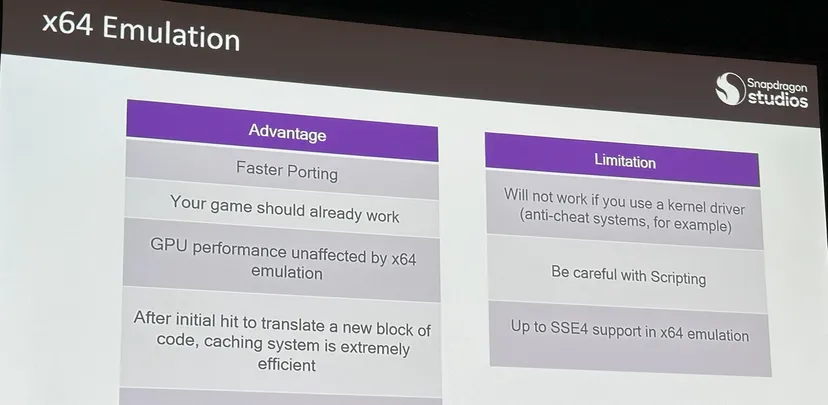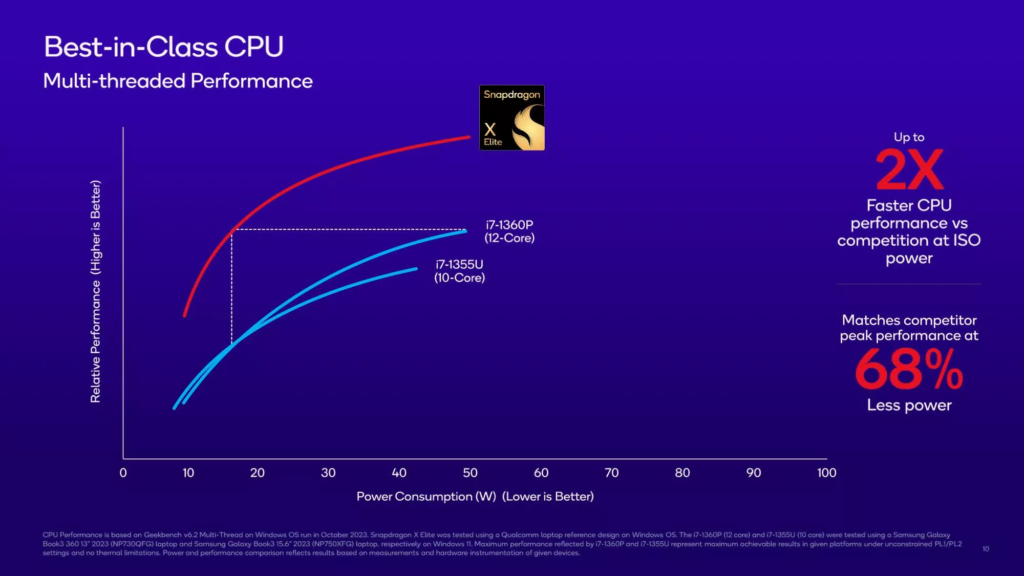
This summer will see the arrival of Snapdragon X Elite notebooks, with Qualcomm urging game developers to prepare.
Table of Contents
Could Qualcomm Finally Achieve Apple’s Success with Arm-Based Laptops?
Could Qualcomm potentially replicate Apple’s success and finally produce Arm-based laptops worth investing in, after 15 years of attempts? One promising indication suggests they might: Qualcomm is informing game developers that their titles should seamlessly function on a new wave of Snapdragon-powered Windows laptops without requiring any porting.
During a session at the 2024 Game Developers Conference titled “Windows on Snapdragon, a Platform Ready for your PC Games,” Qualcomm engineer Issam Khalil emphasized that the upcoming laptops, which have yet to be announced, will utilize emulation to run x86/64 games at nearly full speed.
These laptops could be arriving sooner than expected. Qualcomm has confirmed the launch of Snapdragon X Elite systems for this summer, and sources suggest that unannounced consumer versions of the Surface Pro 10 and Surface Laptop 6, equipped with these chips, are anticipated to debut in May, according to The Verge.

In 2020, we highlighted how Apple revolutionized our perception of laptop performance overnight, particularly through its Rosetta 2 translation layer, enabling their chips to run legacy x86 apps with minimal performance degradation. However, while Windows has long supported x64 emulation, Qualcomm’s confidence in it seemed somewhat uncertain until now.
With Windows on Snapdragon, developers have three choices, as explained by Khalil:
- They can opt to port their titles to native ARM64 for optimal CPU performance and power efficiency, as Qualcomm’s scheduler can dynamically adjust the CPU’s frequency accordingly.
- They can develop a hybrid “ARM64EC” application where Windows, its libraries, and Qualcomm’s drivers operate natively, while the remainder of the app is emulated, yielding “near-native” performance.
- Alternatively, they can make minimal adjustments, as their game should function seamlessly using x64 emulation without requiring any code or asset modifications.

According to Qualcomm, developers shouldn’t experience any significant slowdowns. Most games are primarily constrained by GPU performance rather than CPU, and Qualcomm asserts that GPU performance remains unaffected. Although there may be a slight impact on CPU performance during translation or transitions between x64 and ARM64, this only occurs during the initial translation of a code block, with subsequent passes benefiting from direct cache access.
Qualcomm claims to have Adreno GPU drivers supporting DX11, DX12, Vulkan, and OpenCL, along with additional support for DX9 and OpenGL 4.6 through mapping layers.
However, there are certain limitations outlined in the presentation: games relying on kernel-level anti-cheat drivers or utilizing AVX instruction sets won’t function under emulation at present. Khalil suggests developers use SIMDe to expedite the conversion of AVX code to NEON code. These limitations also apply to ARM64EC applications.

While declining to disclose specific games or the extent of Qualcomm’s testing, the company indicates that it is evaluating all the leading games on Steam. This comprehensive assessment gives Qualcomm confidence that the majority of titles should function properly.
According to Micah Knapp, senior director of product management, it’s crucial for Qualcomm to offer compatibility with existing games. Knapp emphasized this point in a recent interview, stating, “In the immediate and foreseeable future, it’s essential to support the games people already have.”
Knapp expressed realism regarding the speed of game developers’ transition to porting their titles to Arm architecture, stating, “As much as I would like this transition to happen quickly, not all developers will immediately commit to porting their software to Arm.”
However, the actual gaming performance of a Snapdragon X Elite chip remains unknown, whether in emulation mode or not. When questioned about whether Arm has demonstrated superior gaming performance and battery life compared to x86, Knapp stated that he has witnessed either scenario but not both simultaneously.

Qualcomm’s presentation at GDC had a modest audience of approximately 33 attendees, including the author and at least one other Qualcomm employee. Although the presentation slides provide some insight, the true capabilities of the Snapdragon X Elite chip in gaming applications remain to be seen.
The concept of porting x86 games is gaining momentum across various platforms. Valve’s Steam Deck initiative has expanded the availability of Windows games on Linux, while Apple offers a tool to bring these games to Mac. Now, with Microsoft and Qualcomm’s potential collaboration, similar opportunities may arise for a different variant of Windows.



Pingback: Why is Windows 11 so frustrating? - Newzertainment